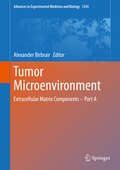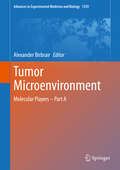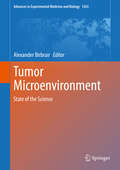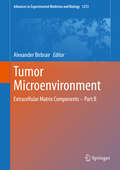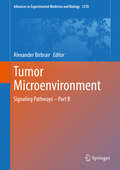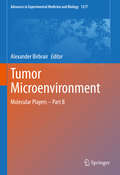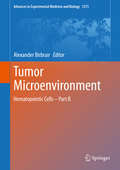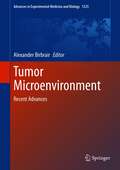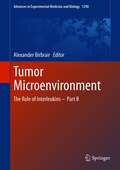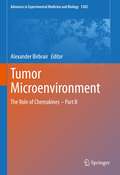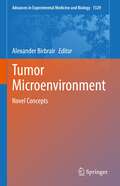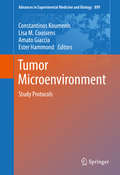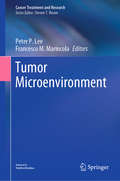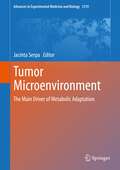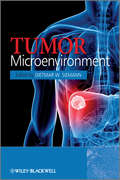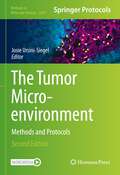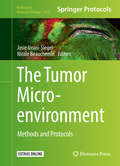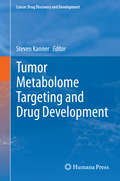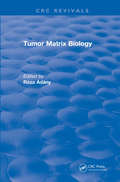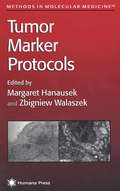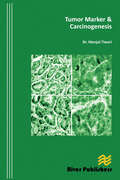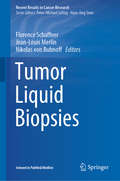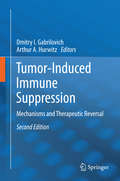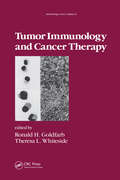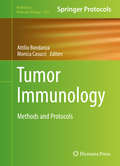- Table View
- List View
Tumor Microenvironment: Extracellular Matrix Components – Part A (Advances in Experimental Medicine and Biology #1245)
by Alexander BirbrairRevealing essential roles of the tumor microenvironment in cancer progression, this volume focuses on the extracellular matrix components of the tumor during cancer development. Further, it teaches readers about the roles of distinct constituents of the tumor microenvironment and how they affect cancer development. Topics include heparan sulphate, hyaluronan, fibronectin, perlecan, glypican, matrix metalloproteinases, and much more. Taken alongside its companion volumes, Tumor Microenvironment: Extracellular Matrix Components – Part A updates us on what we know about the different aspects of the tumor microenvironment, as well as apprises us on the future advances in the field. For the newest generation of researchers, this volume serves as a useful introduction to the history of scientists’ focus on the tumor microenvironment, and explores how this knowledge is currently applied in cancer treatments. The book is an essential text for advanced cell biology and cancer biology students, as well as for scientists seeking an update on the developments in tumor microenvironment research.All of the chapter authors are renowned international experts in the field of cancer biology, and in the specific subfields that are the focus of their chapters.
Tumor Microenvironment: Molecular Players – Part A (Advances in Experimental Medicine and Biology #1259)
by Alexander BirbrairThis book provides a comprehensive overview of the latest research on the molecular players in the tumor microenvironment, including Cathepsin D, galectins, iron, oxygen, Phospholipase D1, leptin, extracellular vesicles, and more. Taken alongside its companion volumes, these books update us on what we know about the tumor microenvironment as well as future directions. Tumor Microenvironment: Molecular Players – Part A is essential reading for advanced cell biology and cancer biology students as well as researchers seeking an update on research in the tumor microenvironment.
Tumor Microenvironment: State of the Science (Advances in Experimental Medicine and Biology #1263)
by Alexander BirbrairRevealing essential roles of the tumor microenvironment in cancer progression, this book provides a comprehensive overview of the latest research in the field. A variety of topics are covered, including metabolism in the tumor microenvironment, stellate cells and endothelial progenitors in the tumor microenvironment, as well as the effects of HIV, viral hepatitis, and inflammation in the tumor microenvironment, and more. Taken alongside its companion volumes, Tumor Microenvironment: State of the Science updates us on what we know about various aspects of the tumor microenvironment, as well as future directions. This book is essential reading for advanced cell biology and cancer biology students as well as researchers seeking an update on research in the tumor microenvironment.
Tumor Microenvironment: Molecular Players - Part A (Advances In Experimental Medicine And Biology Series #1259)
by Alexander BirbrairRevealing essential roles of the tumor microenvironment in cancer progression, this volume focuses on the extracellular matrix components of the tumor microenvironment during cancer development. Furthermore, it teaches readers about the roles of distinct constituents of the tumor microenvironment and how they affect cancer development. Topics include elastin, decorin, syndecan-1, versican, lipoproteins, brevican, thrombospondin, and much more. Taken alongside its companion volumes, Tumor Microenvironment: Extracellular Matrix Components – Part B updates us on what we know about the different aspects of the tumor microenvironment, as well as apprises us on the future advances in the field. For the newest generation of researchers, this volume serves as a useful introduction to the history of scientists’ focus on the tumor microenvironment, and explores how this knowledge is currently applied in cancer treatments. The book is an essential text for advanced cell biology and cancer biology students, as well as for scientists seeking an update on the developments in tumor microenvironment research. All of the chapters authors are renowned international experts in the field of cancer biology, and in the specific subfields that are the focus of their chapters.
Tumor Microenvironment: Signaling Pathways – Part B (Advances in Experimental Medicine and Biology #1270)
by Alexander BirbrairRevealing essential roles of the tumor microenvironment in cancer progression, this book provides a comprehensive overview of the latest research on how different signaling pathways are important in the tumor microenvironment. Multiple signaling pathways are covered, including Src, Neuregulin, Adenosine, TGFβ, Androgen, Wnt, and more.Taken alongside its companion volumes, these books update us on what we know about various aspects of the tumor microenvironment as well as future directions. Tumor Microenvironment: Signaling Pathways – Part B is essential reading for advanced cell biology and cancer biology students as well as researchers seeking an update on research in the tumor microenvironment.
Tumor Microenvironment: Molecular Players – Part B (Advances in Experimental Medicine and Biology #1277)
by Alexander BirbrairThis book provides a comprehensive overview of the latest research on the molecular players in the tumor microenvironment, including MicroRNAs, estrogen, Caveolin-1, Nitric Oxide, RANK/RANKL signaling, , COX-2 Signaling, Renin–angiotensin system, and more. Taken alongside its companion volumes, Tumor Microenvironment: Molecular Players – Part B updates us on what we know about the tumor microenvironment, as well as future directions. This book is essential reading for advanced cell biology and cancer biology students as well as researchers seeking an update on research in the tumor microenvironment.
Tumor Microenvironment: Hematopoietic Cells – Part B (Advances in Experimental Medicine and Biology #1273)
by Alexander BirbrairRevealing essential roles of the tumor microenvironment in cancer progression, this book focuses on the role of hematopoietic components of the tumor microenvironment. Further, it teaches readers about the roles of distinct constituents of the tumor microenvironment and how they affect cancer development. Topics include eosinophils, NK cells, γδ T cells, regulatory T Cells, Langerhans cells, hematopoietic stem cells, Mast cells, B cells and Microglia, and more. Taken alongside its companion volumes, Tumor Microenvironment: Hematopoietic Cells – Part B updates us on what we know about various aspects of the tumor microenvironment as well as future directions. This book is essential reading for advanced cell biology and cancer biology students as well as researchers seeking an update on research in the tumor microenvironment.
Tumor Microenvironment: Recent Advances (Advances in Experimental Medicine and Biology #1225)
by Alexander BirbrairThis volume discusses recent research advances in cancer biology, focusing on the role of the tumor microenvironment. Taken alongside its companion volumes, Tumor Microenvironment: Recent Advances covers the latest research on various aspects of the tumor microenvironment, as well as future directions. Useful for introducing the newer generation of researchers to the history of how scientists studied the tumor microenvironment as well as how this knowledge is currently applied for cancer treatments, it will be essential reading for advanced cell biology and cancer biology students, as well as researchers seeking an update on research on the tumor microenvironment.
Tumor Microenvironment: The Role of Interleukins – Part B (Advances in Experimental Medicine and Biology #1290)
by Alexander BirbrairRevealing essential roles of the tumor microenvironment in cancer progression, this book provides a comprehensive overview of the latest research on the role of interleukins in the tumor microenvironment. Each chapter focuses on the various ways to target the tumor microenvironment by intervention in the interleukin biology, including IL-6, IL-7, IL-10, IL-12, IL-22, IL-23, and IL-24 signaling.Taken alongside its companion volumes, Tumor Microenvironment: The Role of Interleukins – Part B updates us on what we know about various aspects of the tumor microenvironment, as well as future directions. This book is essential reading for advanced cell biology and cancer biology students as well as researchers seeking an update on research in the tumor microenvironment.
Tumor Microenvironment: The Role of Chemokines – Part B (Advances in Experimental Medicine and Biology #1302)
by Alexander BirbrairRevealing essential roles of the tumor microenvironment in cancer progression, this book provides a comprehensive overview of the latest research on the role of chemokines in the tumor microenvironment. Each chapter focuses on the chemokines patterns of expression, their regulation, and their roles in immune cell recruitment, as well as how they affect cancer immunity and tumorigenesis.Taken alongside its companion volumes, Tumor Microenvironment: The Role of Chemokines – Part B updates us on what we know about various aspects of the tumor microenvironment, as well as apprises us on future directions in the field. This book is essential reading for advanced cell biology and cancer biology students as well as scientists seeking an update on recent developments and research in the tumor microenvironment.
Tumor Microenvironment: Novel Concepts (Advances in Experimental Medicine and Biology #1329)
by Alexander BirbrairThis volume discusses novel concepts in cancer biology, focusing on different factors that affect the tumor microenvironment. Topics covered include sex-based differences in the tumor microenironment, dormancy in the tumor microenvironment, the influence of obesity on the tumor microenvironment, and much more. Taken alongside its companion volumes, Tumor Microenvironment: Novel Concepts covers the latest research on various aspects of the tumor microenvironment, as well as future directions. Useful for introducing the newer generation of researchers to the history of how scientists studied the tumor microenvironment as well as how this knowledge is currently applied for cancer treatments, it will be essential reading for advanced cell biology and cancer biology students, as well as researchers seeking an update on research on the tumor microenvironment.
Tumor Microenvironment
by Constantinos Koumenis Lisa M. M. Coussens Amato Giaccia Ester HammondThis volume covers the topics presented at the 3rd International Conference on Tumor Microenvironment and Cellular Stress by an international community of researchers. The conference brings together scientists to discuss different cellular and animal models of tumor microenvironment study and identify common pathways that are candidates for therapeutic intervention; stimulate collaboration between groups that are more focused on elucidation of biochemical aspects of stress biology (e. g. , HIF regulation) and groups that study the pathophysiological aspects of stress pathways or engaged in drug discovery; and critically evaluate novel targets for imaging or therapeutic intervention that would be of use to the tumor microenvironment community and pharmaceutical industry.
Tumor Microenvironment (Cancer Treatment and Research #180)
by Francesco M. Marincola Peter P. LeeThis book addresses the biological processes relevant to the immune phenotypes of cancer and their significance for immune responsiveness, based on the premise that malignant cells manipulate their surroundings through an evolutionary process that is controlled by interactions with innate immune sensors as well as the adaptive recognition of self/non-self. Checkpoint inhibitor therapy is now an accepted new form of cancer treatment. Other immuno-oncology approaches, such as adoptive cell therapy and metabolic inhibitors, have also shown promising results for specific indications. Immune resistance is common, however, limiting the efficacy of immunotherapy in many common cancer types. The reasons for such resistance are diverse and peculiar to the immune landscapes of individual cancers, and to the treatment modality used. Accordingly, approaches to circumvent resistance need to take into account context-specific genetic, biological and environmental factors that may affect the cancer immune cycle, and which can best be understood by studying the target tissue and correlated systemic immune markers. Understanding the major requirements for the evolutionary process governing human cancer growth in the immune-competent host will guide effective therapeutic choices that are tailored to the biology of individual cancers.
Tumor Microenvironment: The Main Driver of Metabolic Adaptation (Advances in Experimental Medicine and Biology #1219)
by Jacinta SerpaThe way a cell undergoes malignant transformation should meet their capacity of surviving in the microenvironment of the organ where the cancer will develop. Metabolic adaptation is for sure one of the criteria that must be accomplished, driven by metabolic plasticity that allows the adaptation of cancer cells to the availability of energy and biomass sources that will sustain cell survival and proliferation. Each human organ has a particular microenvironment which depends on several cell types and in some cases also on symbiotic microorganisms. These biological partners are constantly sharing organic compounds and signaling molecules that will control mitogenesis, cell death and differentiation, accounting for the organ's function. Nevertheless, cancer cells are capable of taking advantage of this metabolic and signaling microenvironmental dynamics.In this book, we intend to present the different components of the microenvironment driving the metabolic fitness of cancer cells. The metabolic changes required for establishing a tumor in a given microenvironment and how these metabolic changes limit the response to drugs will generally be the major items addressed. It is important to mention not only aspects of the microenvironment that stimulate metabolic changes and that select better adapted tumor cells, but also how this regulation of cell plasticity is made. Thus, the signaling pathways that orchestrate and are orchestrated throughout this panoply of metabolic rearrangements will also be addressed in this book. The subjects will be presented from the conceptual point of view of the cross-cancer mechanisms and also particularizing some models that can be examples and enlightening within the different areas.
Tumor Microenvironment
by Dietmar W. SiemannThe microenvironment in which a tumor originates plays a critical role in its initiation and progression. Tumor Microenvironment reviews the importance of tumor microenvironment in cancer management. Particular emphasis is placed on discussing how the unique characteristics of the tumor microenvironment not only impact disease progression and response to conventional anticancer therapies, but have also led to the identification of potential new therapeutic targets and treatment possibilities for cancer patients. Tumor Microenvironment also reviews the fundamental basis of target development, preclinical assessment, and the current clinical status of these therapies.
The Tumor Microenvironment: Methods and Protocols (Methods in Molecular Biology #2614)
by Josie Ursini-SiegelThis second edition provides update and new chapters detailing core and emerging in vitro and in vivo protocols. Chapters guide readers through cellular and molecular biology approaches, in vivo genetic approaches, various “omics”-based strategies, therapeutic strategies, and advanced techniques in the fields of tissue engineering and nanotechnology. Written in the highly successful Methods in Molecular Biology series format, chapters include introductions to their respective topics, lists of the necessary materials and reagents, step-by-step, readily reproducible laboratory protocols, and tips on troubleshooting and avoiding known pitfalls. Cutting-edge and thorough, The Tumor Microenvironment: Methods and Protocols, Second Edition is a valuable resource for both novice and expert scientists in this developing field.
The Tumor Microenvironment
by Josie Ursini-Siegel Nicole BeaucheminThis book covers core and emerging in vitro and in vivo protocols used to study how various components of the tumor microenvironment are established and subsequently interact with tumor cells to facilitate carcinogenesis. In addition, the book examines research topics including cellular and molecular biology approaches, in vivo genetic approaches, various omics -based strategies, therapeutic strategies to target the microenvironment, and, finally, advanced techniques in the fields of tissue engineering and nanotechnology. Written and validated in the laboratories of a number of trusted collaborating authors for the highly successful Methods in Molecular Biology series, chapters contain introductions to their respective topics, lists of the necessary materials and reagents, step-by-step, readily reproducible laboratory protocols, and tips on troubleshooting and avoiding known pitfalls. Practical and authoritative, The Tumor Microenvironment: Methods and Protocols constitutes a compendium of techniques now available to a broad audience, including basic and clinician scientists, systems biologists, and biological engineers. "
Tumor Metabolome Targeting and Drug Development
by Steven KannerIn this volume, the major metabolic alterations identified in cancer and tumor-associated cells are explored, including discussions of former and emerging approaches to drug development in targeting cancer cell metabolism. The metabolic network in cells promotes the generation of both energy and biomass needed for them to grow, divide and differentiate. However, the metabolism of malignant cells generally varies from that of normal cells. These differences provide a platform for the discovery of new approaches to targeting potential vulnerabilities in cancer cells for therapeutic options Some of the significant changes that occur involve ATP production and consumption that modulates the ATP to ADP ratio, hypoxia and the effects of reactive oxygen species on glycolysis, regulation of mitochondrial respiration, induction and suppression of autophagy, and the Warburg effect and "reverse" Warburg effect--these topics and more are discussed in this volume.
Tumor Matrix Biology (CRC Press Revivals)
by Roza AdanyThis book would like to present the latest findings on different aspects of tumor matrix formation in connection with the tumor progression and metastasis and on alterations in the cellular components of tumor stroma during tumor demarcation and invasion.
Tumor Marker Protocols
by Zbigniew Walaszek Margaret HanausekA much-needed collection of cutting-edge methods for the detection and discovery of new cancer markers, particularly molecular tumor markers. Each method is fully described by a hands-on expert who regularly uses it in the laboratory and has perfected it to a high degree of ready reproducibility. Special emphasis is given to statistical considerations in the analysis of tumor markers, recent discoveries in the field of serum and tissue marker proteins, cytogenetic markers, molecular markers, and markers for the early detection of cancer. The well-honed procedures detailed here will enable cancer researchers and clinical oncologists alike to realize the promise of these powerful new diagnostic strategies for the detection, therapy, and successful prevention of cancer.
Tumor Marker and Carcinogenesis
by Manjul TiwariCancer may be regarded as a group of diseases characterized by an (i) abnormal growth of cells (ii) ability to invade adjacent tissue and even distant organs and(iii) the eventual death of the affected patient if the tumor has progressed beyond that stage when it can be successfully removed.
Tumor Liquid Biopsies (Recent Results in Cancer Research #215)
by Florence Schaffner Jean-Louis Merlin Nikolas Von BubnoffThis book is a comprehensive guide to the techniques, clinical applications, and benefits of the different forms of liquid biopsy employed in patients with a variety of tumor types, including lung, breast and colorectal cancer. Offering detailed explanations, it discusses the how changes in tumors can be tracked using these cutting-edge technologies, which enable the detection and analysis of diverse circulating biomarkers: tumor cells, tumor DNA, tumor RNA (free or in exosomes), and fluid biomarkers identifiable by means of targeted proteomics. The use of such advanced technologies is enabling us to tackle questions and problems in a way that was not possible just a few years ago. We now have at our disposal an effective means of overcoming the problem of intratumor heterogeneity, which has limited the value of conventional biopsy approaches. As a consequence, oncology practice is about to change radically, toward truly personalized precision medicine. This book provides both clinicians and researchers with a thorough and up-to-date overview of progress in the field.
Tumor-Induced Immune Suppression
by Dmitry I. Gabrilovich Arthur Andrew HurwitzTumor-Induced Immune Suppression - Prospects and Progress in Mechanisms and Therapeutic Reversalpresents a comprehensive overview of large number of different mechanisms of immune dysfunction in cancer and therapeutic approaches to their correction. This includes the number of novel mechanisms that has never before been discussed in previous monographs. The last decades were characterized by substantial progress in the understanding of the role of the immune system in tumor progression. Researchers have learned how to manipulate the immune system to generate tumor specific immune response, which raises high expectations for immunotherapy to provide breakthroughs in cancer treatment. It is increasingly clear that tumor-induced abnormalities in the immune system not only hampers natural tumor immune surveillance, but also limits the effect of cancer immunotherapy. Therefore, it is critically important to understand the mechanisms of tumor-induced immune suppression to make any progress in the field and this monograph provides these important insights.
Tumor Immunology and Cancer Therapy
by R. H. GoldfarbBased on a Tumor Immunology Symposium held in Pittsburgh, this work provides comprehensive coverage of the most important aspects of tumor immunology. It reveals novel approaches to the immunotherapy of cancer and presents complex issues in an accessible manner.
Tumor Immunology
by Monica Casucci Attilio BondanzaThis volume explores the still undiscovered secrets of tumor immunology and cancer immunology by discussing the methods and techniques that world-renowned experts in the field use in their laboratories. This book provides a better understanding of the rules governing tumor and cancer immunology, and discusses innovations in the technology of the immunological "smart bullets" (monoclonal antibodies, vaccines, tumor-reactive T cells) used to specifically target cancer cells. Written in the highly successful Methods in Molecular Biology series format, chapters include introductions to their respective topics, lists of the necessary materials and reagents, step-by-step, readily reproducible laboratory protocols, and tips on troubleshooting and avoiding known pitfalls. Thorough and cutting-edge, Tumor Immunology: Methods and Protocols contains a wide breadth of subject coverage that any scientist, clinician, or industry professional interested in this field will find valuable.
